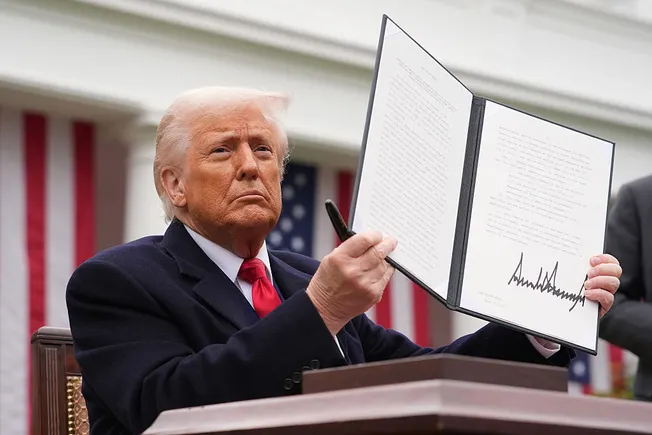
This sound is produced automatically. Please let us know if you have feedback.
President Donald Trump has used several executive powers to approve a wide range of tariffs, including the country’s specific taxes, which are due to return on August 1. However, the use of Trump’s future for tariffs is determined as a tool of negotiation in court, where several countries and jobs intend to argue that he lacks the legal competence that creates business and creates business to turn his business into demonstrations and create business in order to create trade in all countries.
One of the important steps to challenge Trump’s tariff began on Thursday. The government faces a lawyer against lawyers from five companies and 12 states before 11 judges of the US Court of Appeal. The court will decide whether its residence will prevent a US international trade ruling that prevents Trump’s widespread use of duties, including the 10 % global tariff and various taxes in the country without adoption.
Case, VOS Selections, Inc. v TrumpOne of the several petitions with the plaintiffs with tariffs against the Trump administration is. Here’s a look at the five of these things and where they are currently standing.
1 VOS Selections, Inc. v. Trump
On April 14, VOS Selections and four other import companies sued the Trump administration in the USCit, claiming that the president had exceeded his legal authority by imposing unauthorized congressional tariffs (IEPA).
The plaintiffs also claimed that the tariff would damage them financially by increasing costs and disrupting their performance.
On April 23, 12 states made a parallel petition, mainly the same arguments. Therefore, the USCit consolidated the two, and one delegation of three judges on May 28 ordered that the President had no jurisdiction to impose tariffs across the IEPA board of directors. As a result of the findings, USCit issued a permanent order against future tariffs.
The Trump administration immediately renewed the ruling to the US appeal court for the federal circuit, which, considering the appeal, issued a temporary residency. Oral arguments for this case are due to begin on Thursday.
The hearing is unusual because all 11 judges argue instead of arguing through one delegation of three more ordinary judges. The hearing is reserved for exceptional importance and shows that judges want to reflect a ruling that reflects the general view of the court.
2 Learn RS. , Participation in vs. Trump
On April 22, Learning Resources and Hand2mind Inc. Two small jobs in educational products challenged a lawsuit that challenges the legality of Trump’s tariffs as IEPA.
A US district court judge issued a preliminary ruling for Columbia district on May 29 and prevented IEEPA from collecting two plaintiffs. However, the US Court of Appeal for the Colombia County (CADC) issued a government request for residence so that it could judge the case.
3 State of California vs. Trump
On April 16, California sued Trump in the US North California regional court and challenged the president’s powers to impose extensive tariffs under IEPA. The petition claims that the tariff has gone beyond Trump’s presidency and has caused significant damage to California’s economy, jobs and consumers.
A district court judge in June rejected the case for the reasons for the judicial area and the USCit petition was a lawsuit. California then sought to investigate the appeal at the US Court of Appeal for the Ninth Circuit. A decision is waiting.
4 Webber, and colleagues. v. US Department of Homeland Security
On April 11, Montana State Senator, Susan Webber and Jonathan St. Goodard, both citizens of Blackfeet Nation, complained of the United States and the US Homeland Security Office, challenging executive orders and leaflets that would impose new tariffs for goods from Canada. The plaintiffs filed a petition in the US Regional Regional Court for the Montana area.
The plaintiffs challenged the tariff orders and claimed that according to IEPA law and the expansion of trade, they exceeded the presidential authority and legal authority. As the Trump administration claimed, the petition also did not claim that the external threat did not justify widespread tariffs.
The case also says that Trump’s actions violate two treaties signed by the US government: the 1794 Treaty and the 1814 Gent Treaty, which, according to plaintiffs, exempts native trade.
The district court issued a government request to transfer the case to USCit on April 25 and the petition was owned by the specialized court. The plaintiffs revised the transfer order to the ninth appeals court, which rejected the request.
5 Axle of DearBorn, Inc. In front of the Trading Group
On May 16, Axle of Dearborn, which trades as Detroit Axle, challenged the USCIT against the trade sector and three other federal agencies and eliminated the legality of several executives that eliminate the de Minimis exemption.
The distributor of Automotive parts based in Michigan argues that the president lacks legal authority and the constitution to revoke exemption, allowing imports without valuable goods worth less than $ 800. The company urged the court to block several executive order for implementing tariffs and banning exemptions.
The government argues that the President has the power to take “emergency” actions, including the recapture of Minimis as part of responding to international trade threats.
The Trump administration demanded that the VOS selection case was resolved. On July 28, USCit awarded a residence.
This story was first published in our weekly newsletter. Register here